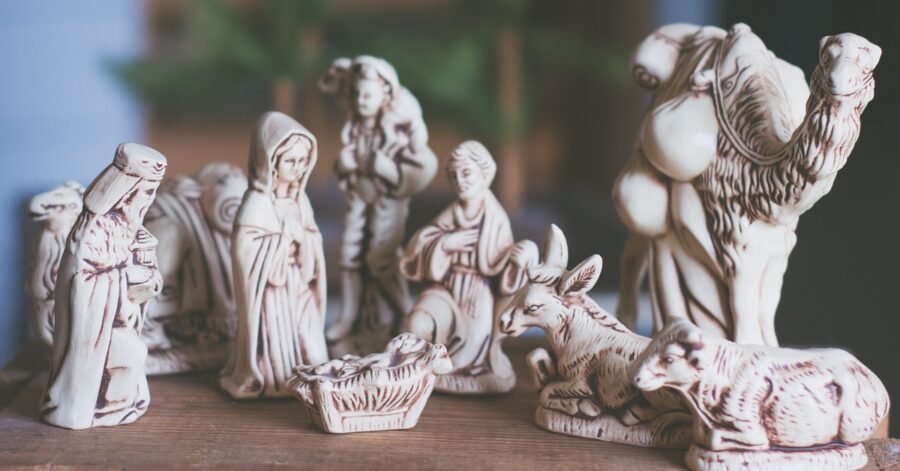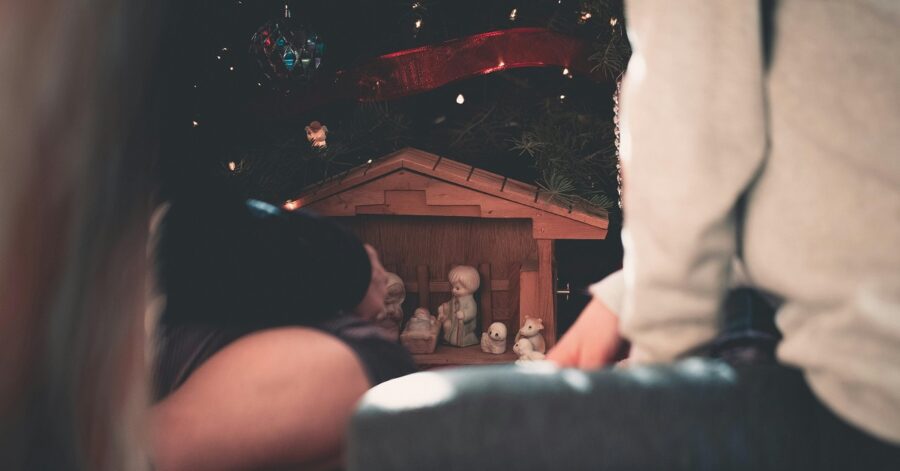If you are like my family, growing up, you had a nativity scene displayed during the Christmas season. Maybe you’ve been practicing this tradition with your family, like we have been with ours. As you pull the figures out of storage, hoping none have been broken, you set it up for Christmas. We use the same collection with my children that I’d set up as a child (but with a few more battle scars). We group the sheep and shepherds, Joseph and Mary and Jesus. Our nativity display also includes the Magi, the three wise men in the Bible, bringing gifts to the newborn King, though technically, they shouldn’t have been there—they didn’t arrive for another few years.
The Magi and Jesus
I’ve been thinking a lot about what generational faithfulness looks like as the years pass by. My children grow older, and my limited time for intense influence in their lives becomes more apparent. We don’t have a lot of historical examples of successful generational faithfulness. In Judges 2:10 (NKJV), we read, “When all that generation had been gathered to their fathers, another generation arose after them who did not know the LORD nor the work which He had done for Israel.”
Even the line of Jesus, which we read in Matthew’s gospel and whose history is well documented, was likely caught up in generations of unbelief. In Matthew 1:11-12 (NKJV), we’re drawn into the genealogy of Christ: “Josiah begot Jeconiah and his brothers about the time they were carried away to Babylon. And after they were brought to Babylon, Jeconiah begot Shealtiel, and Shealtiel begot Zerubbabel.”
Being carried away to Babylon is critical to the redemptive arc of Scripture. Many of us know the account of the prophet Daniel, who is famous for being spared in the lion’s den. We need also to remember that long before that landmark event, Daniel was called upon to interpret King Nebuchadnezzar’s troubling dream.
The King was intensely frustrated that all his wise men (Magi, taken from the Old Persian maguš) could not tell him the meaning of his dream. This made the king so furious that he ordered the execution of all the wise men of Babylon. Daniel intervenes and asks the king for more time so that he might interpret the dream.
In a vision, God reveals the mystery of the king’s dream to Daniel during the night. Daniel praises the God of heaven and then asks to be taken to Nebuchadnezzar. In the book of Daniel, chapter 2, verse 44, as the prophet is concluding his interpretation, he foretells the coming of Christ. “And in the days of these kings shall the God of heaven set up a kingdom, which shall never be destroyed: and the kingdom shall not be left to other people, but it shall break in pieces and consume all these kingdoms, and it shall stand forever.” Then, the king placed Daniel in a high position, and in verse 48, “. . . made him ruler over the whole province of Babylon, and chief of the governors over all the wise men of Babylon.”
Spared from execution, the wise men of Daniel’s time endure, and 12 to 14 generations later would see the sign of the Bethlehem Star and begin making their journey to worship Jesus!
Lessons from the Magi
Babylon carried away the treasures of the house of God (Daniel 1:2) and the three wise men in the Bible who bring gifts to Jesus, symbolically return them (Matthew 2:11). It’s not too coincidental that they were warned in a dream to return home a different way, because King Herod was on a violent tear to find and destroy the newborn King who they had come to worship, and they outwitted him. Once again, the proper interpretation of a dream results in God’s kingdom-purposes fulfilled. How amazing is our Lord!
We don’t have a record of or really know how faithful each specific generation of Magi was, but they must have retained and reviewed the records of Daniel’s interpretation of King Nebuchadnezzar’s dream. But it is likely they would have kept the framework of Daniel’s prophecy in mind as history unfolded over time. Kingdoms decayed, split, rose, and fell. Perhaps it would not have been a surprise to them to learn that the Messiah, Jesus Christ, had come to save the Gentiles and that he always had a plan for Adam’s and then Noah’s offspring.
Meaning of the Nativity Scene
This Christmas, when you are setting up the nativity display with your family, tell your family about the faithfulness through the generations of the Magi. Talk about the wise men who faithfully passed down the account of what the Lord had done in Babylon during the time of Daniel. Babylon’s greatest leader, Daniel the Magi, saved their ancestors from certain death because he was given the power to understand dreams and visions from the Lord God. The Magi who came to worship Jesus were the recipients of a kind of generational faithfulness.
As you place baby Jesus in his manger of straw and arrange the nativity scene, consider with me the long-term influence of the wise men. They worshiped the Savior, Jesus Christ, who has restored us to eternal life through his life, death, and resurrection. May this kind of influence be so for me and for you this Christmas. Glory to God in the highest!

Discover fun Christmas activities for your kids, students of all ages, and the whole family.





